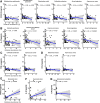Gut microbiota composition reflects disease severity and dysfunctional immune responses in patients with COVID-19
- PMID: 33431578
- PMCID: PMC7804842
- DOI: 10.1136/gutjnl-2020-323020
Gut microbiota composition reflects disease severity and dysfunctional immune responses in patients with COVID-19
Abstract
Objective: Although COVID-19 is primarily a respiratory illness, there is mounting evidence suggesting that the GI tract is involved in this disease. We investigated whether the gut microbiome is linked to disease severity in patients with COVID-19, and whether perturbations in microbiome composition, if any, resolve with clearance of the SARS-CoV-2 virus.
Methods: In this two-hospital cohort study, we obtained blood, stool and patient records from 100 patients with laboratory-confirmed SARS-CoV-2 infection. Serial stool samples were collected from 27 of the 100 patients up to 30 days after clearance of SARS-CoV-2. Gut microbiome compositions were characterised by shotgun sequencing total DNA extracted from stools. Concentrations of inflammatory cytokines and blood markers were measured from plasma.
Results: Gut microbiome composition was significantly altered in patients with COVID-19 compared with non-COVID-19 individuals irrespective of whether patients had received medication (p<0.01). Several gut commensals with known immunomodulatory potential such as Faecalibacterium prausnitzii, Eubacterium rectale and bifidobacteria were underrepresented in patients and remained low in samples collected up to 30 days after disease resolution. Moreover, this perturbed composition exhibited stratification with disease severity concordant with elevated concentrations of inflammatory cytokines and blood markers such as C reactive protein, lactate dehydrogenase, aspartate aminotransferase and gamma-glutamyl transferase.
Conclusion: Associations between gut microbiota composition, levels of cytokines and inflammatory markers in patients with COVID-19 suggest that the gut microbiome is involved in the magnitude of COVID-19 severity possibly via modulating host immune responses. Furthermore, the gut microbiota dysbiosis after disease resolution could contribute to persistent symptoms, highlighting a need to understand how gut microorganisms are involved in inflammation and COVID-19.
Keywords: colonic bacteria; colonic microflora; inflammation.
© Author(s) (or their employer(s)) 2021. Re-use permitted under CC BY-NC. No commercial re-use. See rights and permissions. Published by BMJ.
Conflict of interest statement
Competing interests: None declared.
Figures




Comment in
-
Six-month follow-up of gut microbiota richness in patients with COVID-19.Gut. 2022 Jan;71(1):222-225. doi: 10.1136/gutjnl-2021-324090. Epub 2021 Apr 8. Gut. 2022. PMID: 33833065 Free PMC article. No abstract available.
-
Gut microbiota changes are detected in asymptomatic very young children with SARS-CoV-2 infection.Gut. 2022 Nov;71(11):2371-2373. doi: 10.1136/gutjnl-2021-326599. Epub 2022 Feb 8. Gut. 2022. PMID: 35135843 Free PMC article. No abstract available.
References
Publication types
MeSH terms
Substances
LinkOut - more resources
Full Text Sources
Other Literature Sources
Medical
Research Materials
Miscellaneous
